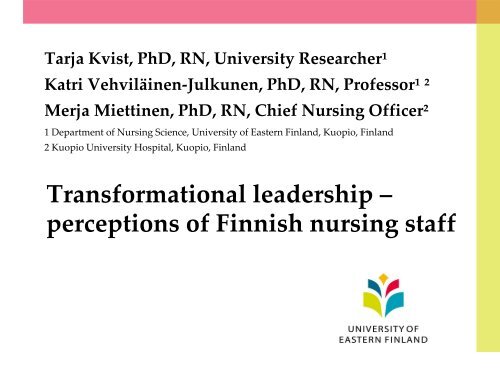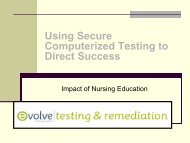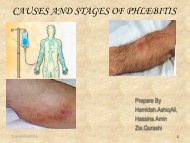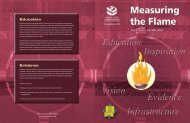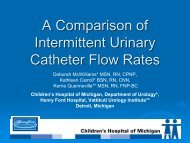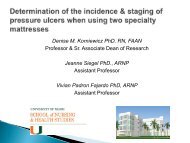Tarja Kvist - IUPUI
Tarja Kvist - IUPUI
Tarja Kvist - IUPUI
You also want an ePaper? Increase the reach of your titles
YUMPU automatically turns print PDFs into web optimized ePapers that Google loves.
<strong>Tarja</strong> <strong>Kvist</strong>, PhD, RN, University Researcher¹<br />
Katri Vehviläinen-Julkunen, PhD, RN, Professor¹ ²<br />
Merja Miettinen, PhD, RN, Chief Nursing Officer²<br />
1 Department of Nursing Science, University of Eastern Finland, Kuopio, Finland<br />
2 Kuopio University Hospital, Kuopio, Finland<br />
Transformational leadership –<br />
perceptions of Finnish nursing staff
University of Eastern Finland<br />
– A University of the Future<br />
• The Universities of Joensuu and<br />
Kuopio constituted the University of<br />
Eastern Finland, effective from 1<br />
January 2010.<br />
•The University of Eastern Finland is<br />
an international and multidisciplinary<br />
university with a firm status among<br />
the leading universities in Finland.<br />
•The University of Eastern Finland has<br />
its main campuses in Joensuu and<br />
Kuopio, and there is also a campus in<br />
Savonlinna.<br />
.<br />
1.11.2011
Department of Nursing Science
The Research Programme within the<br />
Department of Nursing Science<br />
•The two main threads within the Research Programme<br />
are<br />
1) Health Promotion in Different Cultures and<br />
Contexts and<br />
2) Health Service, Health Care Education, Clinical<br />
Outcomes and the Effectiveness of Nursing Care.<br />
1.11.2011 4
Masters Degree Programmes in Nursing<br />
Science<br />
•In 1979, the Department of Nursing Science was the first<br />
university department in Finland to offer a degree programme<br />
in Health Administration with Nursing Science as a major.<br />
•Today, the Department offers a modern Masters Degree<br />
Programme in Nursing Science (Nursing Leadership and<br />
Management, Preventive Nursing Science, Nurse Teacher<br />
Education).<br />
•Since 2007 “Master’s Degree Programme in Health Promotion in<br />
Nursing Science” for international students, delivered in<br />
English.<br />
1.11.2011
Masters graduates in nursing science can<br />
develop their expertise through further<br />
postgraduate studies<br />
•PhD education<br />
– in co-operation with the other national departments<br />
of Nursing Science, collectively known as the<br />
“Finnish Post-Graduate School of Nursing Science”<br />
and<br />
– in the multidisciplinary post-graduate school at<br />
University of Eastern Finland, as well as<br />
– in collaboration with international post-graduate<br />
schools.<br />
Esityksen nimi / Tekijä 1.11.2011 6
Background of the study:<br />
Transformational leadership –<br />
perceptions of Fnnish nursing staff<br />
•Department of Nursing Science in University of Eastern<br />
Finland (earlier University of Kuopio)and Kuopio<br />
University Hospital together with three central hospitals<br />
started Attractive and Safety Hospital research and<br />
development project in 2006.<br />
•The aim of the project is to develop these hospitals like<br />
the Magnet hospitals are.<br />
•One part of this project is leadership as one component<br />
of Magnet model’s five components is transformational<br />
leadership.<br />
1.11.2011 7
Transformational leaders<br />
•Are visible, accessible, collaborative, knowledgeable,<br />
positive and supportive.<br />
•These leaders share organizational goals, support<br />
learning opportunities and career development, have<br />
reward schemes, promote autonomy and participation,<br />
use different empowerment strategies and healthy work<br />
environment programs.<br />
1.11.2011 8
Purpose of this study<br />
•To describe how transformational are Finnish nursing<br />
leaders perceived by nursing staff and find the<br />
differences in their perceptions by demographic<br />
variables.<br />
1.11.2011 9
Methods<br />
•The study was descriptive, cross-sectional and<br />
quantitative.<br />
•1550 hospital nursing staff (RN, LPN, radiographers, lab<br />
nurses, physiotherapistists e.g.) of fours hospitals in<br />
Northern Savo Hospital District (one university hospital<br />
and three central hospitals) and one Hospital for Joint<br />
Replacement Coxa answered the web based survey.<br />
•Response rate 27%<br />
•The instrument was developed based on the large<br />
literature review by researchers and the pilot study was<br />
made in 2007 and basic data collection in 2008 (n=1160).<br />
1.11.2011 10
Instrument<br />
•10 background questions<br />
•43 items about the leadership of the nurse manager<br />
•11 items about the leadership of the nursing director<br />
•5-point Likert scale with response categories ranging<br />
from fully disagree, partly disagree, cannot say, partly<br />
agree and fully agree<br />
1.11.2011
Data analysis<br />
•Data were analyzed using SPSS version 17.<br />
•Descriptive statistics (frequencies, means, chi square<br />
test)<br />
•Based on the exploratory factor analysis, five mean<br />
scores were formed<br />
•Nonparametric tests were used in the data analysis<br />
1.11.2011 12
Demographics<br />
2010 (N=5809, n=1550, 27%)<br />
Gender<br />
Female 88 %<br />
Male 12 %<br />
Age<br />
Mean 43 years<br />
Professions<br />
Nurses 76 %<br />
Physioterapists, laboratory nurses and radiographers 9 %<br />
Practical nurses 13 %<br />
Others 2 %<br />
Type of employment<br />
Permanent: 79 %<br />
Temporary: 21 %<br />
Working hours<br />
Daytime work: 31 %<br />
Shift work: 69 %<br />
1.11.2011 13
Demographics<br />
2010 (N=5809, n=1550, 27%)<br />
Lenght of work experience in current unit<br />
Mean: 10 years<br />
Lenght of work experience in this hospital<br />
Mean: 13 years<br />
Lenght of work experience in this profession<br />
Mean: 15 years<br />
The quality of care in the working unit: 8,0 (scale: 4-10)<br />
1.11.2011 14
5<br />
4.5<br />
4<br />
3.5<br />
3<br />
2.5<br />
2<br />
1.5<br />
1<br />
Transformational leadership in five study<br />
hospitals<br />
Ethical leadership Management of the nursing *Giving process feedback *Support & rewarding for the professional development<br />
*Nursing director *Transformational leadership<br />
* = significant (p
5<br />
4.5<br />
4<br />
3.5<br />
3<br />
2.5<br />
2<br />
1.5<br />
1<br />
Transformational leadership in<br />
specialized working areas<br />
*Ethical leadership *Management of<br />
the nursing<br />
process<br />
* = significant (p
5<br />
4.5<br />
4<br />
3.5<br />
3<br />
2.5<br />
2<br />
1.5<br />
1<br />
Transformational leadership by<br />
professions<br />
* = significant (p
Transformational leadership by<br />
agegroups<br />
5<br />
4.5<br />
4<br />
3.5<br />
3<br />
2.5<br />
2<br />
1.5<br />
1<br />
Ethical leadership Management of<br />
the nursing<br />
process<br />
Giving feedback<br />
and rewardig<br />
Support for the<br />
professional<br />
development<br />
Nursing director Transformational<br />
leadership<br />
Under 30 years (n=257)<br />
31-40 years (n=367)<br />
41-50 years (n=503)<br />
Over 51 years (n=413)<br />
1.11.2011 18
5<br />
4.5<br />
4<br />
3.5<br />
3<br />
2.5<br />
2<br />
1.5<br />
1<br />
Transformational leadership by the<br />
length of work experience in current unit<br />
*Ethical leadership *Management of<br />
the nursing<br />
* = significant (p
5<br />
4.5<br />
4<br />
3.5<br />
3<br />
2.5<br />
2<br />
1.5<br />
1<br />
Transformational leadership by the<br />
length of work experience in current<br />
hospital<br />
*Ethical leadership *Management of<br />
the nursing<br />
process<br />
* = significant (n
5<br />
4.5<br />
4<br />
3.5<br />
3<br />
2.5<br />
2<br />
1.5<br />
1<br />
Transformational leadership by the<br />
length of total work experience<br />
*Ethical leadership *Management of<br />
the nursing<br />
process<br />
* = significant (p
5<br />
4.5<br />
4<br />
3.5<br />
3<br />
2.5<br />
2<br />
1.5<br />
1<br />
Transformational leadership by quality of<br />
care<br />
*Ethical<br />
leadership<br />
* = significant (p
Conclusion: Finnish transformational<br />
leadership<br />
5<br />
4.5<br />
4<br />
3.5<br />
3<br />
2.5<br />
2<br />
1.5<br />
1<br />
3.57<br />
3.42<br />
3,00<br />
3.66<br />
3.03<br />
3.34<br />
Ethical leadership (n=1545)<br />
Management of the nursing process (n=1545)<br />
Giving feedback and rewarding (n=1544)<br />
Support for the professional development<br />
(n=1545)<br />
Nursing director (n=1534)<br />
Transformational leadership (n=1546)<br />
1.11.2011 23
Conclusions<br />
•Finnish nursing leaders are humane leaders<br />
•Finnish nursing leaders need to make themselves more<br />
visible<br />
•Finnish nursing leaders are well educated, but the staff<br />
cannot see their knowledge<br />
•Finnish nursing leaders have to develop rewarding<br />
systems<br />
•Shared leadership would be one possibility to develop<br />
Finnish nursing leadership towards more<br />
transformational<br />
1.11.2011 24
Welcome to Kuopio!<br />
tarja.kvist@uef.fi<br />
1.11.2011 25


